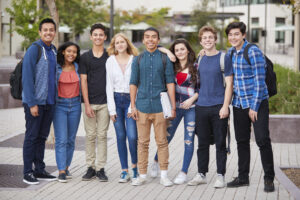The US military is famous for many things; its enormous size, ridiculous budget, occasional scandal. They are also keenly interested in recruiting high school students, as declining enlistment rates have worried them for years. They have several tactics to this end, from scholarships to recruiters in high schools, but one holds particular interest for us today: their summer research programs.
The US military is one of the largest funders of research and development on the planet. This research is all fairly directed of course, but they still do a lot of it. This means that they are also always looking to recruit students with a passion and talent for engineering and research, and to that end they have created a number of summer research opportunities. In this article, we’re going to review these opportunities, who they’re for, and whether or not they’re a good choice for you. Let’s jump right in!
Naval Science and Engineering Apprenticeship Program
The Science and Engineering Apprenticeship Program (usually abbreviated as SEAP), is, as the name suggests, run by the US Navy. This program places students in Naval laboratories around the country, where they spend eight weeks working as interns on research projects. Students get to experience hands-on research and work with experts, while the Navy gets to give these students a taste of what working for them is like, with an eye towards recruiting them in the future.
This program is open to high school students who have completed grade nine and who are currently enrolled. Graduating seniors are eligible to apply. You must be at least 16 or older by the start date of your internship to participate. This program is only open to US citizens. 300 students are selected each year, and are placed in 38 different labs around the country.
This program is free, and indeed provides a stipend to students who participate. This is currently $4,000 for first-time students, or $4,500 for returning students. Note that housing is not provided by any of these labs, and you are responsible for arranging that. Many students apply for labs close to home for that reason. You can find a full list of the labs available through the SEAP program here.
The application is available online from August 1 through November 1 of the prior year. All applications must be submitted online before this deadline. When you apply, you first choose which labs you want to work at, based on location and your research interests. You may apply to a maximum of three labs.
The application requires a personal statement, transcripts, and references. These should come from teachers who can speak to your skill and interest in science and engineering. Your application is evaluated by the labs you apply to, and selections are made on the basis of your academic preparation, and how likely it is that you will succeed in the lab environment.
Is SEAP a Good Choice for You?
If you are interested in engineering or marine science, then there is probably a lot to recommend this program for you. Unlike some other programs sponsored by the military, this one does not come with any service commitments, as is the case for all their high school programs. They do want to recruit students using these programs, but this is more subtle, giving you a taste of what they offer, and hoping you come back for more. If you are qualified and interested in engineering, this is a good choice, especially if you have an existing interest in potential Naval service.
Air Force Research Laboratory Scholars Program
The Air Force Research Laboratory (AFRL) has a program is primarily for undergraduate students, but does offer opportunities for advanced high school students to pursue research internships working on current projects in an active lab. While there are fewer spaces for high school students, they are still admitted into the program each year, and take part in the same research.
In order to be eligible for the program you must have a GPA of at least 3.0 on a 4.0 scale, must be a US citizen, must be enrolled in school and in good academic standing, and must be at least 16 years of age by the start date of the internship. The program is eight weeks in length, and students spend 40 hours each week actively working in a research lab. You must be available for the full length of the program.
The application for the program must be submitted online. This requires a personal statement, a resume, an unofficial transcript, and references who will submit letters of recommendation on your behalf. They suggest these be teachers who can speak to your interest and experience in science and engineering.
This program is free to participants, and provides a weekly stipend to high school students of $492.40 per week. Note that housing is not provided by the program, and you are also required to figure out your own transit to and from the research lab each day. You may be required to get a security clearance; they make sure to say that you cannot get rides onto military bases from people without a security clearance.
You can find a list of potential research topics here. You must select which you want to participate in when you apply. Your application is evaluated based on your academic accomplishment, fit for that particular research area, and prior experience with research.
Is AFRL a Good Choice for You?
If you are interested in aerospace engineering, then this is one of the best ways to delve deep into it as a high school student outside of Nasa’s programs. They do have limited spaces for high school students compared to undergraduates, but as competitive as this program is, it is well worth it for interested students. If you are qualified, and interested in aerospace engineering, then we recommend applying to this program.
US Army Research Internships
The US Army offers a number of different internship programs for high school students, all under a single umbrella. These programs last eight to ten weeks in the summer, and provide a stipend. As with all programs run by the US military, these are only open to US citizens.
Eligibility requirements vary by lab site, though all have the citizenship and age requirement of 16. All of these programs do provide a stipend, and none of them have application fees; they want to make it as easy as possible for students to apply. Some of these programs are specifically designed to encourage underrepresented groups to apply, and therefore encourage applications from these groups.
Applications for this program are accepted and evaluated on a rolling basis. You must apply online; you select which lab and program you are applying to when you apply. Applications require the online form, a transcript, letters of recommendation, and an essay response. You are evaluated based on your prior experience, academic record, and fit for the lab you are applying to.
Housing is not provided at any of these programs, nor is transportation. Students are required to arrange this for themselves for the length of the program. These programs mostly focus on various engineering fields, from material to structural to mechanical. What each lab is studying is diverse, and you apply to the ones which best suit your interests.
Are Army Research Internships Right for You?
As with all military research internships, these are designed to get you interested in pursuing further work with them, as a recruiting tool aimed at students who might not be swayed by other measures. The army needs to do a lot of research and development, and need to find a new generation of workers regularly to enter these labs.
If you are interested in engineering and live near one of these labs, then this is a good opportunity for you. Arranging housing otherwise may be difficult, but the stipend these provide can offset the costs, and unlike the ROTC, there’s no requirement to enlist afterwards (though they do want you to).
Final Thoughts
The programs offered by the US military are certainly not right for every student, both by the nature of their eligibility requirements, and because not every student is ok with working on military projects. That said, they do offer an excellent way to take part in engineering based research, and to get paid for doing so. While the lack of housing can be a hurdle, this is similar to a large number of other full-time research programs offered by non-university labs. They have no way to house students, so you are left to figure this out on your own.
We hope that this article has given you good insight into the various internship programs offered by the US military, and whether or not they are a good option for you. There are a lot of ways you can spend your summer, but taking part in a serious research project will always look good when it comes time to apply to colleges. If you are looking for advice on what kind of summer program will best serve your needs, or help applying to one of these excellent programs, then schedule a free consultation with us today. We have a long history helping students find the programs that best let them explore their passions, and are always happy to hear from you.








